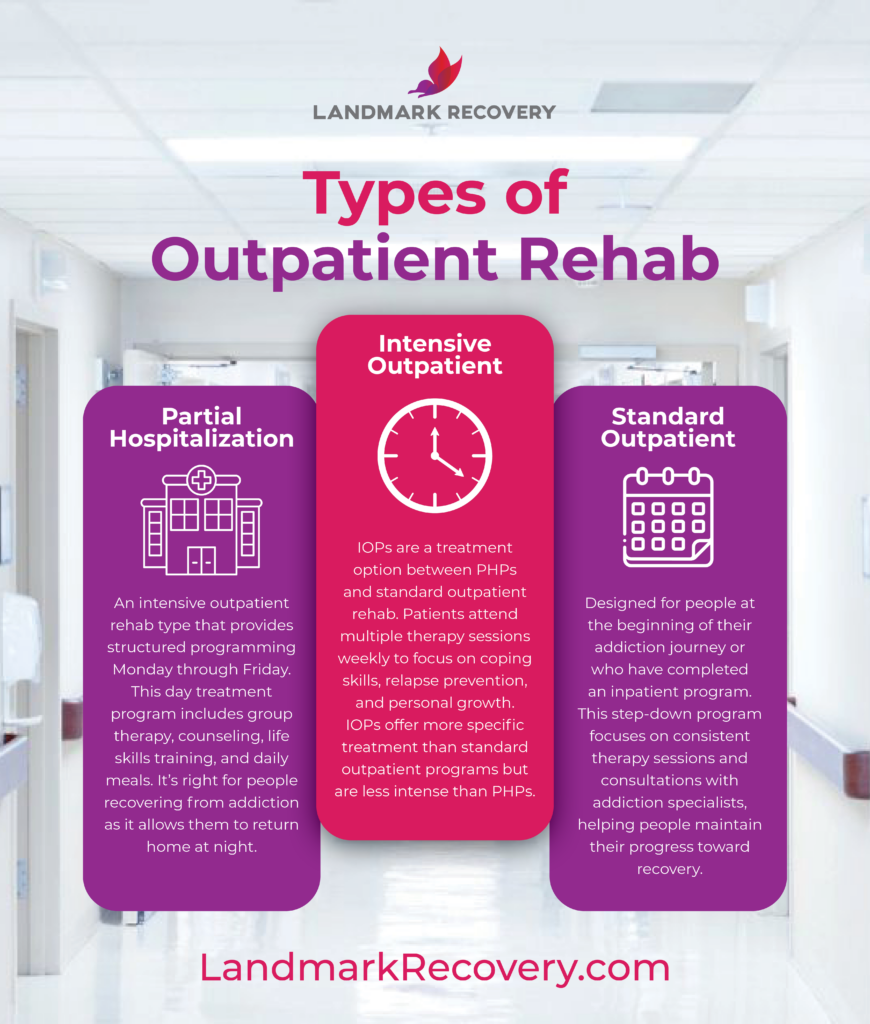Updated: July 11, 2023, at 10:05 a.m.
Key points in this blog:
- Understanding the concept of outpatient rehab
- The differences between inpatient and outpatient rehab
- Types of outpatient rehab
- Daily life during outpatient rehab
What is Outpatient Rehab?
Outpatient rehab is a flexible addiction treatment program that allows people in recovery to continue their daily routines while they heal from drugs or alcohol. Unlike inpatient rehab, which requires patients to stay overnight at a residential treatment center, outpatient rehab is designed to integrate with a person’s daily life. This means you can continue with your job, education, or familial duties while learning to live in long-term recovery.
How Does Outpatient Rehab Work?
Outpatient rehab works around your schedule. Treatment sessions are planned according to your availability, ensuring you can meet your daily commitments while receiving the personal care and support you need. Typically, outpatient programs involve a combination of:
- Individual therapy
- Group counseling
- Family therapy
- Psychoeducation classes about addiction and recovery (with family)
This balanced approach allows for personal reflection, mutual support from peers, and learning healthy life skills, all of which play a critical role in recovery.
Outpatient Treatment Types
If you’re looking for addiction treatment that gives you some flexibility and isn’t as intense, consider outpatient rehab programs that can be tailored to your needs.
- Partial Hospitalization Programs (PHPs): An intensive outpatient rehab type that provides structured programming Monday through Friday. This day treatment program includes group therapy, counseling, life skills training, and daily meals. It’s right for people recovering from addiction as it allows them to return home at night.
- Intensive Outpatient Programs (IOP): IOPs are a treatment option between PHPs and standard outpatient rehab. Patients attend multiple therapy sessions weekly to focus on coping skills, relapse prevention, and personal growth. IOPs offer more specific treatment than standard outpatient programs but are less intense than PHPs.
- Standard Outpatient Treatment: Designed for people at the beginning of their addiction journey or who have completed an inpatient program. This step-down program focuses on consistent therapy sessions and consultations with addiction specialists, helping people maintain their progress toward recovery.
Inpatient vs. Outpatient: What’s Best for You?
Choosing between inpatient and outpatient rehab can be tough. Inpatient rehab involves living at a treatment center with 24/7 support, which is best if you have a severe substance use disorder (SUD) or an unstable living situation. Outpatient rehab allows you to get treatment while living at home, which may work best if you have a solid support system and motivation. Choose what’s best for your needs, addiction severity, and personal responsibilities.
Remember, the most effective choice is the one that best fits your life and promotes long-term recovery.
Daily Life in Outpatient Rehab
Outpatient rehab requires dedication and commitment but provides flexibility that other treatment options may not offer. A typical day may involve attending school or work in the morning, followed by a few hours of therapy sessions and recovery education classes in the afternoon or evening. These sessions may include individual therapy, group sessions, educational classes about addiction, and training in new life skills.
The goal is to balance treatment with normal life so that patients can build a healthier future without completely disrupting their present.
How Long Does Outpatient Rehab Last?
Outpatient rehab can last anywhere from one to six months, but everyone progresses at their own pace, so the timeline isn’t set in stone. Your treatment plan will be evaluated frequently and adjusted to meet your needs and progress. This flexible approach ensures you get the help you need for as long as necessary.
Getting Into Outpatient Treatment Programs
If you’re considering joining an outpatient rehab program like Landmark Recovery, you must go through assessments, evaluations, and drug tests. These tests will help determine your condition and create a personalized treatment plan. Outpatient programs are usually designed for people diagnosed with moderate-to-severe substance use disorder following DSM-5 guidelines.
Take the Next Step with Landmark Recovery
We understand that the journey to recovery can be demanding, so we offer Intensive Outpatient Programs (IOPs) and Partial Hospitalization Programs (PHP) that provide extra support and flexibility. With our personalized approach, we’ll work with you to create a plan that meets your unique needs and goals. You don’t have to face addiction alone – let us help you find the path to a healthier, happier life.
Call our confidential admissions line at 888-448-0302; we can talk 24/7/365. Visit our locations page to find an outpatient rehab center near you.
More Outpatient Treatment Resources
When it comes to addiction, it’s important to have all the information you need to make the best choices for yourself or a loved one. We’ve listed blogs below to help you stay informed. Read over them and call our admissions team if you have any questions.
- Inpatient Vs. Outpatient Treatment
- What Are Intensive Outpatient Programs (IOPs) for Drug Addiction?
- Typical Day in a Drug Rehab Center
- Do I Have to Quit My Job to Get Addiction Treatment?
- Does Drug and Alcohol Rehab Work?
- When is Residential Treatment Necessary?
- How to Get Into Rehab Immediately

Choose Recovery Over Addiction
We're here 24/7 to help you get the care you need to live life on your terms, without drugs or alcohol. Talk to our recovery specialists today and learn about our integrated treatment programs.







